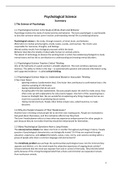Samenvatting
Summary Psychological Science
- Instelling
- Rijksuniversiteit Groningen (RuG)
Volledige en duidelijke samenvatting van Psychological Science (hele boek behalve H2). Er staan veel plaatjes, tabellen en voorbeelden in om het studeren nog makkelijker en leuker te maken! Daarnaast is het erg neutraal zodat je er zelf nog gemakkelijk met kleurtjes in kan markeren.
[Meer zien]




